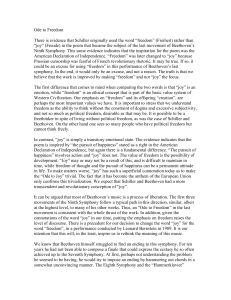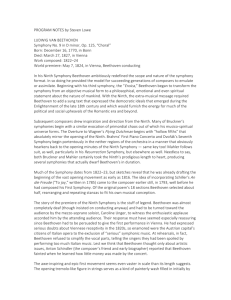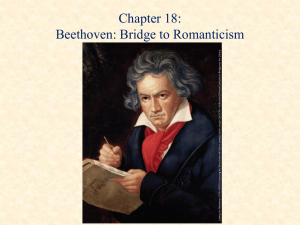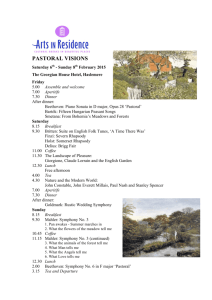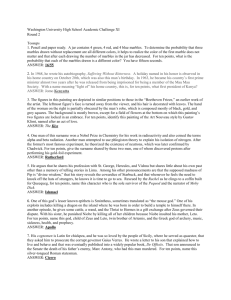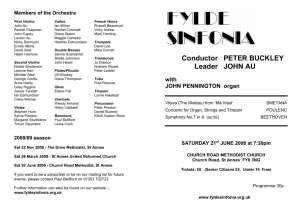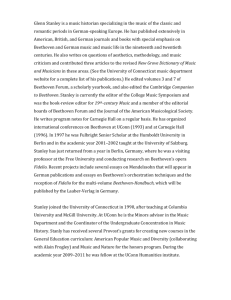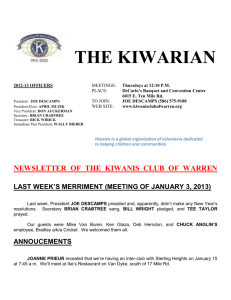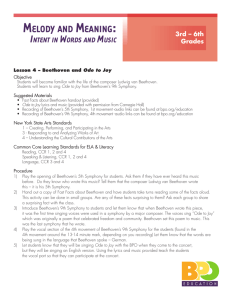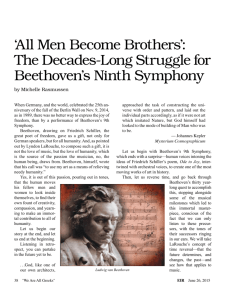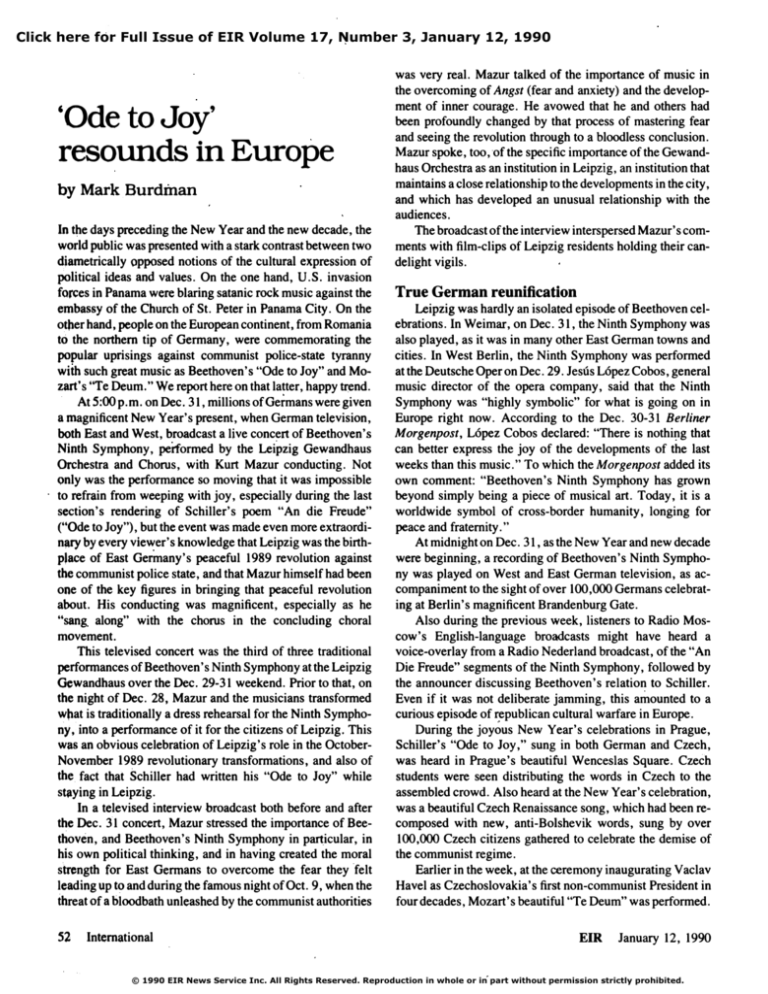
Click here for Full Issue of EIR Volume 17, Number 3, January 12, 1990
was very real. Mazur talked of the importance of music in
the overcoming of Angst (fear and anxiety) and the develop­
ment of inner courage. He avowed that he and others had
'Ode to Joy'
resounds in Europe
by Mark
.
been profoundly changed by that process of mastering fear
and seeing the revolution through to a bloodless conclusion.
Mazur spoke, too, of the specific importance of the Gewand­
haus Orchestra as an institution in Leipzig, an institution that
maintains a close relationship to the developments in the city,
Burdman
and which has developed an unusual relationship with the
In the days preceding the New Year and the new decade, the
audiences.
The broadcast of the interview interspersed Mazur's com­
world public was presented with a stark contrast between two
ments with film-clips of Leipzig residents holding their can­
diametrically opposed notions of the cultural e�pression of
delight vigils.
political ideas and values. On the one hand, U.S. invasion
forces in Panama were blaring satlJIlic rock music against the
embassy of the Church of St. Peter in Panama City. On the
True German reunification
ottter hand. people on the European continent. from Romania
ebrations. In Weimar, on Dec. 31, the Ninth Symphony was
Leipzig was hardly an isolated episode of Beethoven cel­
to the northern tip of Germany, were commemorating the
also played, as it was in many other East German towns and
popular uprisings against communist police-state tyranny
cities. In West Berlin, the Ninth Symphony was performed
with such great music as Beethoven's "Ode to Joy" and Mo­
at the Deutsche Oper on Dec. 29. Jesus L6pez Cobos, general
zart's "Te Deum." We report here on that latter, happy �nd.
music director of the opera company, said that the Ninth
AtS:OOp.m. on Dec 31, millions ofOermans were given
.
Symphony was "highly symbolic" for what is going on in
a magnificent New Year's present, when German television,
Europe right now. According to the Dec. 30-31 Berliner
both East and West, broadcast a ljve concert of Beethoven's
Ninth Symphony, performed by the Leipzig Gewandhaus
Orchestra and Chorus, with Kurt Mazur conducting. Not
Morgenpost, L6pez Cobos declared: "There is nothing that
only was the performance so moving that it was impossible
own comment: "Beethoven's Ninth Symphony has grown
to refrain from weeping with joy, especially during the last
beyond simply being a piece of musical art. Today, it is a
can better express the joy of the developments of the last
weeks than this music." To which the Morgenpost added its
section's rendering of Schiller's poem "An die Freude"
worldwide symbol of cross-border humanity, longing for
("Ode to Joy"), but the event was made even more extraordi­
peace and fraternity."
n!U')' by every viewer's knowledge that Leipzig was the birth­
At midnight on Dec. 31, as the New Year and new decade
place of East Germany's peaceful 1989 revolution against
were beginning, a recording of Beethoven's Ninth Sympho­
the communist police state, and that Mazur himself had been
one of the key figures in bringing that peaceful revolution
ny was played on West and East German television, as ac­
about. His conducting was magnificent, especially as he
ing at Berlin's magnificent Brandenburg Gate.
"sang along" with the chorus in the concluding choral
companiment to the sight of over 100,000 Germans celebrat­
Also during the previous week, listeners to Radio Mos­
cow's English-language broadcasts might have heard a
movement.
This televised concert was the third of three traditional
voice-overlay from a Radio Nederland broadcast, of the "An
performances of Beethoven's Ninth Symphony at the Leipzig
Die Freude" segments of the Ninth Symphony, followed by
Dec 29-31 weekend.
Prior to that, on
the announcer discussing Beethoven's relation to Schiller.
the night of Dec. 28, Mazur and the musicians transformed
Even if it was not deliberate jamming, this amounted to a
wttat is traditionally a dress rehearsal for the Ninth Sympho­
curious episode of repUblican cultural warfare in Europe.
Gewandhaus over the
.
ny,· into a performance of it for the citizens of Leipzig.
This
During the joyous New Year's celebrations in Prague,
was an obvious celebration of Leipzig's role in the October­
November 1989 revolutionary transformations, and also of
the. fact that Schiller had written his "Ode to Joy" while
Schiller's "Ode to Joy," sung in both German and Czech,
was heard in Prague's beautiful Wenceslas Square. Czech
slaying in Leipzig.
assembled crowd. Also heard at the New Year's celebration,
students were seen distributing the words in Czech to the
In a televised interview broadcast both before and after
was a beautiful Czech Renaissance song, which had been re­
the Dec. 31 concert, Mazur stressed the importance of Bee­
composed with new, anti-Bolshevik words, sung by over
thoven, and
Beethoven's Ninth Symphony in particular, in
100,000 Czech citizens gathered
to celebrate the demise of
his own political thinking, and in having created the moral
the communist regime.
leading up to and during the famous night of Oct. 9, when the
Havel as Czechoslovakia's first non-communist President in
threat of a bloodbath unleashed by the communist authorities
four decades, Mozart's beautiful "Te Deum" was performed.
strength for East Germans to overcome the fear they felt
S2
International
Earlier in the week, at the ceremony inaugurating Vaclav
EIR
January 12, 1990
© 1990 EIR News Service Inc. All Rights Reserved. Reproduction in whole or in part without permission strictly prohibited.

